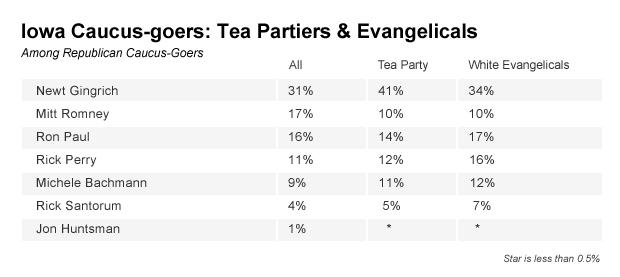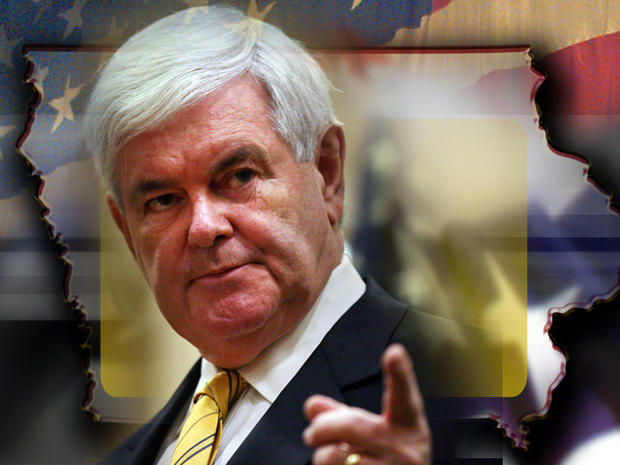Newt Gingrich strong with Iowa evangelicals, Tea Partiers
Newt Gingrich's14-point lead over Mitt Romneyamong likely Iowa Republican caucus-goers is grounded in large part in support from Tea Party and evangelical voters, who have a far more positive view of Gingrich than they do Romney, according to a new CBS News/New York Times poll.
Poll: Gingrich takes double-digit lead over Romney in Iowa
Gingrich wins the support of 34 percent of white evangelicals expected to attend the Republican caucuses on January 3. That's higher than the 31 percent of likely caucus-goers who support Gingrich overall, and far outpaces Romney, who wins the support of just 10 percent of white evangelical caucus-goers. (Ron Paul, Rick Perry and Michele Bachmann also have more support from this group than Romney.)
Gingrich's favorable rating among white evangelical likely caucus-goers is 60 percent - compared to just 31 percent for Romney. Only 18 percent hold an unfavorable view of Gingrich, compared to 43 percent for Romney.
White evangelicals see Gingrich as more prepared to be president than Romney (48 percent to 12 percent), better to handle an international crisis (48 percent to 9 percent), better to handle the economy (22 percent to 11 percent) and having the best chance to beat President Obama next November (37 percent to 24 percent). The electability factor has been central to Romney's argument to conservative voters that they should put aside their misgivings and cast their ballots for him.
The findings suggest that the former House speaker is not being negatively judged by social conservative voters for his personal life, which includes three marriages and the acknowledgement of an extramarital affair.
Still, the survey suggests a candidate's personal life does matter to voters. Among Republican caucus-goers overall, 69 percent say a candidate should be judged on both his or her political record and personal life - a figure that rises to 78 percent among white evangelicals. Twenty-nine percent say candidates should be judged on their political record alone, including 21 percent of White evangelicals. Gingrich leads the pack both among those who say a candidate's record and personal life are important (with 27 percent support) and among those who say only his or her record is important (with 39 percent support).
Gingrich does even better among self-described Tea Party supporters expected to attend the caucuses, with 41 percent support compared to just 10 percent for Romney. (Paul took 14 percent support from Tea Partiers, Perry 12 percent and Bachmann 11 percent.) This despite the fact that Gingrich has been paid millions of dollars to broken influence in Washington, including on behalf of government-sponsored mortgage giant Freddie Mac, and supported the TARP bank bailout that served as an inspiration for the protest movement.
Sixty-eight percent of Republican caucus-goers who back the Tea Party have a favorable view of Gingrich, while just 14 percent hold an unfavorable view. Romney, by contrast, has a net negative favorable rating, with 39 percent in this group viewing him favorably and 44 percent viewing him unfavorably.
These Tea Partiers see Gingrich as more prepared than Romney to be president (56 percent to 11 percent), better to handle an international crisis (54 percent to 8 percent) and more likely to defeat Mr. Obama (45 percent to 19 percent). Fifty-six percent would "enthusiastically" support Gingrich if he were the Republican presidential nominee, compared to just 33 percent for Paul and Romney.
Iowa-caucus goers don't see social issues as paramount: 71 percent overall say candidates should be judged on economic issues, while just 14 percent point to social issues. (13 percent said the two are equally important.) Just 25 percent of white evangelical Republican caucus-goers and 18 percent of Tea Party Republican caucus-goers say social issues matter the most in their vote, while 55 percent of white evangelical Republican caucus-goers and 65 percent of Tea Party caucus-goers cite economic issues as paramount.
Seventy-eight percent of likely caucus-goers overall would be willing to vote for a candidate who is less conservative than they are, while 62 percent would be willing to vote for someone who does not share their view on immigration; 58 percent say they could vote for someone who has changed their position on abortion. One in three would say they would not cast ballots for someone who has changed their position on abortion or disagrees with them on immigration.
More than half of likely Republican caucus-goers (55 percent) say it is at least somewhat important a candidate share their religious beliefs, a figure that rises to 80 percent among white evangelicals. Eighty-five percent overall (including 77 percent of white evangelicals) say they would vote for a Mormon candidate, though just 67 percent say most people they know would vote for a Mormon. Both Romney and Jon Huntsman are Mormon.
Iowa voters see Gingrich, Romney as most electable
In Iowa, it's not all good for Gingrich
CBS News and The New York Times conducted telephone interviews November 30-December 5, 2011 with 642 registered voters who said they would definitely or probably attend the Republican caucus in Iowa. The error due to sampling could be four points for caucus-goers.
The sample was drawn from two sources: the state of Iowa's registered voter list, and an RDD sample of cell phone interviews.
Results were weighted by probabilities of selection and by demographic characteristics to reflect the eligible caucus-goers on the Iowa voter list.
Full CBS News coverage: Newt Gingrich
